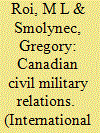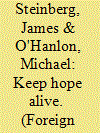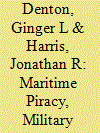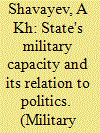|
|
|
Sort Order |
|
|
|
Items / Page
|
|
|
|
|
|
|
| Srl | Item |
| 1 |
ID:
102171


|
|
|
| 2 |
ID:
133059


|
|
|
|
|
| Publication |
2014.
|
| Summary/Abstract |
The Indian soldiers, on account to their faith in the otters who lead them, their innate goodness and the discipline that has been ingrained in them have a great capacity to accept and absorb wrongs but it these continue to happen on a sustained and regular basis, as is happening, then it would be foolish to expect them to keep accepting policies that are patently discriminatory! The aspirations at the military may continue to be ignored but at the risk ot a revolt, or even a coup!
|
|
|
|
|
|
|
|
|
|
|
|
|
|
|
|
| 3 |
ID:
109228


|
|
|
|
|
| Publication |
2011.
|
| Summary/Abstract |
This article expands on the conventional discourse relating rough terrain - mountainous terrain and noncontiguous territory - to civil war onset. In addition to their direct effects on the strategic and tactical logic of insurgency, I argue these factors affect state capacity, as measured by tax capacity, and exert an indirect effect through this channel. Because tax capacity proxies bureaucratic and administrative capacity as well as material resources, it conditions the decision to rebel more than military capacity per se. I find a negative relationship between mountainous terrain and to a lesser extent, noncontiguous territory, and state capacity. Subsequently, I find tax capacity is strongly and negatively associated with civil war onset, though this relationship appears only with longer than conventional temporal lags. The cumulative (direct + indirect effects mediated by state capacity) of rough terrain is roughly 45 per cent larger than its direct effect.
|
|
|
|
|
|
|
|
|
|
|
|
|
|
|
|
| 4 |
ID:
132152


|
|
|
|
|
| Publication |
2014.
|
| Summary/Abstract |
At their summit in California last June, U.S. President Barack Obama and Chinese President Xi Jinping committed themselves to building trust between their countries. Since then, new official forums for communication have been launched (such as the military-to-military dialogues recently announced by the two countries' defense ministers), complementing existing forums such as the Strategic and Economic Dialogue (which features the countries' top diplomats and economic officials). But despite these efforts, trust in both capitals -- and in the countries at large -- remains scarce, and the possibility of an accidental or even intentional conflict between the United States and China seems to be growing. Given the vast potential costs such a conflict would carry for both sides, figuring out how to keep it at bay is among the most important international challenges of the coming years and decades. The factors undermining trust are easy to state. East Asia's security and economic landscape is undergoing massive, tectonic change, driven primarily by China's remarkable economic rise in recent decades. That economic miracle, in turn, has made it possible for China to increase its military capacity and ramp up its political role in the region and beyond. China's leaders and prominent strategists have been at pains to insist that China's rise will be peaceful and poses no threat to its neighbors or the existing international political and economic order. But many members of the world community remain concerned and even skeptical, noting that history and international relations theory are replete with examples of conflict arising from clashes between a dominant and a rising power."
|
|
|
|
|
|
|
|
|
|
|
|
|
|
|
|
| 5 |
ID:
188020


|
|
|
|
|
| Summary/Abstract |
West African security threats have become more frequent in recent years, most notably in the Gulf of Guinea. As increasing quantities of the world’s trade pass through the maritime domain, ship hijackings and other maritime criminal activities have garnered widespread attention from the international community. The International Maritime Bureau reports 785 piracy incidents have occurred in the region since 2000 and current models forecasting worldwide piracy trends have failed to accurately predict maritime crime in all of the West African states. The purpose of this article is to provide an analysis of piracy developments in the Gulf of Guinea. The authors argue that increased military capacity and anocratic regimes lead to increases in piracy while failed states are associated with a decline in such maritime crimes. Data from 2000 to 2016 is used to empirically test this claim. The analysis shows that a state’s military capacity has no impact on the prevalence of piracy events while institutional frameworks and regime type influence the degree and number of maritime attacks off the coast of West Africa. The results imply that institutionally strong and democratic regimes are less likely to experience piracy in the Gulf of Guinea than weak states or anocracies.
|
|
|
|
|
|
|
|
|
|
|
|
|
|
|
|
| 6 |
ID:
097766


|
|
|
|
|
| Publication |
2010.
|
| Summary/Abstract |
This article identifies and addresses key conceptual and measurement issues raised by measures of state capacity in studies of civil conflict. First, it reviews competing definitions and operationalizations of state capacity, focusing specifically on those that emphasize (1) military capacity, (2) bureaucratic administrative capacity, and (3) the quality and coherence of political institutions. Second, it critically assesses these measures on the basis of construct validity, focusing attention on whether they accurately capture the theoretical concept of state capacity, and whether they allow the researcher to differentiate between competing causal mechanisms. Third, it employs principal factor analysis to identify the underlying dimensionality of 15 different operationalizations of state capacity. State capacity is characterized by low dimensionality, with three factors - or dimensions of state capacity - explaining over 90% of the variance in the 15 measures. While the first factor, rational legality, captures bureaucratic and administrative capacity, the second, rentier-autocraticness, and third, neopatrimoniality, capture aspects of state capacity that cut across theoretical categories. The article concludes by suggesting a multivariate approach to modeling state capacity, and that (1) survey measures of bureaucratic quality, and (2) tax capacity are the most theoretically and empirically justified.
|
|
|
|
|
|
|
|
|
|
|
|
|
|
|
|
| 7 |
ID:
131187


|
|
|
|
|
| Publication |
2014.
|
| Summary/Abstract |
The military role's in US foreign policy over the next few years is to be underscored by capacity building abroad and complemented with direct action when necessary, US president Barak Obama said in a 28 May speech.
|
|
|
|
|
|
|
|
|
|
|
|
|
|
|
|
| 8 |
ID:
098964


|
|
|
| 9 |
ID:
110981


|
|
|
|
|
| Publication |
2012.
|
| Summary/Abstract |
The size of the defence cuts made by the UK's coalition government will leave the country's military forces unable to take part in another intervention on the scale of the 2011 operation in Libya, according to a report by the House of Commons Defence Committee. The cross-party parliamentary committee said it believed that the government would face "significantly greater challenges should an operation of similar size be necessary in the future", and recommended that the Strategic Defence and Security Review (SDSR) of October 2010 be reopened.
|
|
|
|
|
|
|
|
|
|
|
|
|
|
|
|
|
|
|
|
|